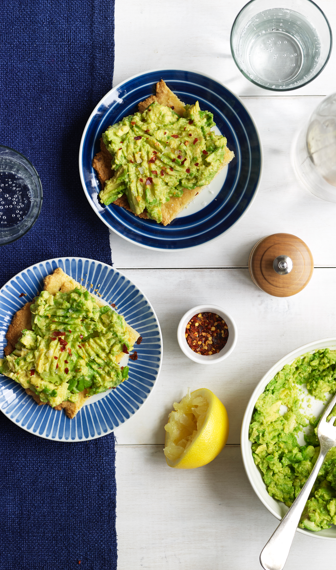Here’s good news for people who don’t want to consume red meat, seafood or poultry with every meal: Soy protein is virtually complete, rich in vitamin E, fiber, calcium, magnesium, lecithin, riboflavin, thiamine, folate, iron and essential fatty acids, missing only the essential amino acid methionine. In addition, 25 grams of soy protein a day can help reduce the risk of heart disease by lowering LDL (“bad”) cholesterol levels.1
Soybeans are the most concentrated source of isoflavones a type of phytoestrogen (estrogen-like compounds found in plants) with antioxidant properties. The two primary isoflavones in soy are daidzein and genistein. Researchers believe that daidzein may reduce the risk of osteoporosis by slowing bone loss, and that genistein may slow the growth of cancer cells and prevent build-up of arterial plaque. Because phytoestrogens mimic the effects of estrogen on a much weaker level, scientists suspect that soy foods can help alleviate the symptoms of menopause and may help prevent some types of cancer without the health risks associated with hormone replacement therapy.2 (On the other hand, if you have low thyroid function or you are a woman with a family history of uterine, ovarian or breast cancer, your doctor may tell you to limit your soy intake to two servings a day.)
More research is needed to clarify the relationship between soy, hormones and menopause. However, in Japan, where soy foods have been a dietary staple for thousands of years, women report fewer symptoms of menopause than do women in Western cultures. The Japanese also report lower levels of breast, colon and prostate cancers, as well as lower rates of osteoporosis and heart disease.3
A food is considered to be high in isoflavones if it provides about 30 milligrams total per serving. If you’re interested in adding soy to your meals but aren’t sure where to start, here’s a primer.
| Soy Food | Nutritional Highlights | How to Use |
| Soymilk
Comes in flavors like vanilla and carob as well as plain. Fortified soymilk is high in vitamins A, B12 and D, calcium, riboflavin and zinc. |
1 cup plain, unfortified soymilk provides:128 calories 16.8 g Net Carbs 6.9 g protein 26 mg isoflavones |
Use in lieu of milk in almost any recipe, or drink as a beverage. Avoid flavored and sweetened varieties. |
| TempehA tender, chunky cake made of fermented soybeans. | 160 calories 3.3 g Net Carbs 15.4 g protein 43 mg isoflavones |
Crumble into soup. Cube, marinate in soy sauce and ginger, then thread onto kebabs with veggies such as bell peppers and mushrooms; grill or broil. |
| Tofu, water-packed(firm, extra-firm) Has a dense texture and mild flavor. |
87 calories 2.9 g Net Carbs 9 g protein 29 mg isoflavones |
Press or freeze to remove extra liquid.To press, place between two skillets or chopping boards; weight down with a heavy can for 15 to 20 minutes. Pour off water, then chop tofu for stir-fries or soups, or mash and use instead of eggs in egg salad.To freeze, wrap in plastic, then freeze overnight or up to three months. Thaw in the refrigerator, then grate or crumble into stews or casseroles. |
| Tofu, soft(silken, firm, extra-firm) Has a custard-like consistency. | 62 calories 3.1 g Net Carbs 5.4 g protein 37.5 mg isoflavones |
Ideal in puréed soups, dips and sauces. Use silken tofu as you would sour cream, or to give smoothies a rich, thick texture. |
| EdamameWhole green soybeans that are boiled 15 to 20 minutes. | 127 calories 6.2 grams Net Carbs 11.1 g protein 49 mg isoflavones |
A wonderful snack—peel off the skins and eat. Very rich in isoflavones. |
Prepared soy foods vary considerably in nutrition; check labels for protein and isoflavone amounts. Some to try are:
- Soy cheeses (cheddar, Parmesan, mozzarella and cream cheese. Make sure to read labels and avoid brands that contain hydrogenated oils.) Use in place of dairy cheese. Those that contain casein, a milk protein, will melt better.
- Soy butter (similar to peanut butter).
- Meat analogs (such as textured soy protein, which can be used like ground beef, as well as bacon, hotdogs and burgers).
- Soy flour, which is much higher in protein and lower in carbohydrate than wheat flour.
- Miso, a paste made of fermented soybeans; use in Miso Soup or mix 2 teaspoons into a couple of scrambled eggs.
- Soy nuts (whole roasted soybeans, similar to peanuts).
- Note that soy sauce and vegetable oils made from soybeans do not provide soy protein or isoflavones.
Selected References:
- Bakhit, R.M., Klein, B.P., Essex-Sorlie, D., et al., “Intake of 25 Grams of Soybean Protein With or Without Soybean Fiber Alters Plasma Lipids in Men with Elevated Cholesterol Concentrations,” Journal of Nutrition, 124(2), 1994, pages 213-222.
- Arena, S., Rappa, C., Del Frate, E., et al., “A Natural Alternative to Menopausal Hormone Replacement Therapy. Phytoestrogens,” Minerva Ginecologica, 54(1), 2002, pages 53-57.
- Somekawa, Y., Chiguchi, M., Ishibashi, T., et al., “Soy Intake Related to Menopausal Symptoms, Serum Lipids, and Bone Mineral Density in Postmenopausal Japanese Women,” Obstetrics and Gynecology, 97(1), 2001, pages 109-115.

